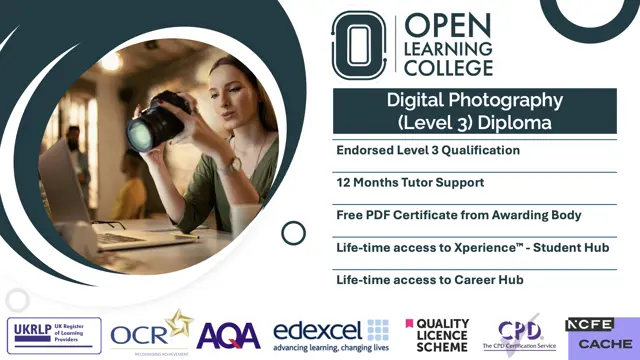Funding options available on our website
- QLS & OPA - Free
- Exam(s) / assessment(s) is included in price
- Tutor is available to students
- TOTUM card included in price What's this?

Funding options available on our website
Embark on a transformative learning journey with the UK’s most innovative home study provider, offering courses designed to unlock your true potential and facilitate the career change you desire. Access our distance learning courses directly from anywhere, anytime, and acquire industry-recognised Professional Qualifications essential for advancing in your career.
Specifically, explore the flexible and convenient Digital Photography (Level 3) course, an ideal way to gain a diploma qualification. Whether you aim for further education, improved job prospects, or expanded knowledge, this comprehensive course allows you to prepare thoroughly for exams or careers through home study. Plus, it’s structured to be accessible and beneficial even if you have no prior knowledge in Digital Photography.
The Digital Photography Diploma is a comprehensive program that delves into the intricacies of photography. It equips you with the knowledge and skills needed to master your camera, manipulate lighting, perfect posing, and discover your unique photographic style and direction.
This diploma covers an array of skills that demystify camera operations, illuminate the art of lighting, and unravel the secrets of creating compelling compositions. Each section is thoughtfully presented in a user-friendly and easily digestible manner, facilitating your learning journey. You can then apply your newfound knowledge in the formal assessments.
Authored by an industry expert, this tailored qualification offers you a rich tapestry of skills, insights, and expertise to expand your photography horizons. Whether you aspire to capture cherished family moments more brilliantly or embark on a professional photography career, this course has you covered.
The program consists of four Units subdivided into twenty modules, each accompanied by assessments. By the end of this course, you’ll achieve the following learning outcomes:
Digital certificate - Included
Open Learning College have undergone external quality checks to ensure that the organisation and the courses’ it offers meet a high standard. Regular reviews of our courses are carried out as part of the endorsement process.
The course depth and study has been benchmarked at Level 3 against level descriptors published by Ofqual.
Visit www.qualitylicencescheme.co.uk for more information.
1. You will receive your accreditation directly from QLS, once you have successfully completed your course (certification fees are included in the course fee).
2. You will receive the Open Pathway Accreditation Diploma (OPA.dip) from Open Learning College.
the Digital Photography (Level 3) course is divided into 4 modules.
Module 1: An Introduction to Digital Photography
This unit looks at the basics of camera controls and rules to start taking simple images while utilising the knowledge covered in this unit. Students will understand the history of Digital Photography, and what equipment they will need to suit what level they would like to progress in photography. Students will understand aperture, f/stop and depth of field to be able to use these in a single image.
Module 2: Digital Photographic Composition
This unit looks at progressing from unit 1, and applying new techniques to broaden skills. Students will learn what file format is best for shooting with depending on the style of photography required. Students will understand exposure compensation, white balance and ISO to improve on their shots from unit 1. Lighting will be covered in natural and artificial light and how best to use it with the advantage of reflectors.
Module 3: The Practicalities of Digital Photography
This unit looks at the practicalities of photography and the steps forward in producing quality images that can be ready for family and friend or clients. 3 specialities are covered in family, portraits and weddings and a brief section on other specialities. This unit looks at giving a more professional critique of the students work and highlighting the professional practice.
Module 4: Applying your Digital Photographic Skills
This final unit looks at the progression that can be taken by the student. It focuses on possible paths and utilising the previous skills covered. Students will learn about the difference between studio lighting and portable and what is suitable for their own needs, what fees and charges they can look to set for their personal photography or at a business rate. New Photoshop and digital editing suits and basics covered. Some career opportunities will be explored and students will gain an insight into what route they may wish to take.
(Please click on the curriculum tab above to see a detailed view of each module)
Target Audience
Course Requirements
If you love taking photos and have an eye for a picture, you can put your photography skills to use in a variety of areas from advertising to social events
Currently there are no reviews for this course. Be the first to leave a review.
This course is advertised on reed.co.uk by the Course Provider, whose terms and conditions apply. Purchases are made directly from the Course Provider, and as such, content and materials are supplied by the Course Provider directly. Reed is acting as agent and not reseller in relation to this course. Reed's only responsibility is to facilitate your payment for the course. It is your responsibility to review and agree to the Course Provider's terms and conditions and satisfy yourself as to the suitability of the course you intend to purchase. Reed will not have any responsibility for the content of the course and/or associated materials.